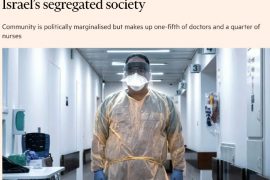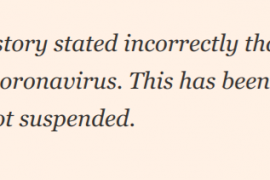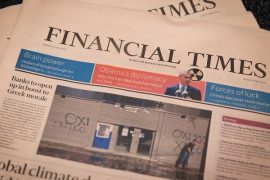A positive Financial Times profile of the anti-Israel London-based group we’ve posted about recently called Forensic Architecture (FA) noted that FA was responsible for an installation at a Manchester museum which included a statement accusing Israel of “apartheid”, “colonialism” and “ethnic cleansing”.
The article, by architecture critic Edwin Heathcote, however, fails to inform readers that the museum ultimately added two new additional statements at the exhibition entrance, one by the Manchester Jewish community critical of the FA statement and, subsequently, another one which responded to the Jewish community’s statement.
But, the article doesn’t focus as much on FA’s views on Israel, as the fact that the group represents what the journalist claims is a “new wave of investigative architects [who] refer to themselves as “spatial practitioners”, using their skills and their way of understanding the world as tools to uncover crimes against humanity and abuses of power by state actors”.
In fairness, Heathcote does acknowledge that FA’s mission can reasonable be criticised, commenting, for instance, that it’s a “remarkable divergence from [architecture’s] traditional path, the transformation of what is effectively a service industry into activism and advocacy for the powerless”.
Nonetheless, he doesn’t devote any space critically examining what some (including this writer) have shown to be the flawed methodology used in FA’s ‘investigations, and ultimately seems to conclude that the politicisation of the discipline is a positive development.
In his own voice, he focuses instead on the ‘righteousness’ of this new architectural mission:
In turning towards social justice and journalism, architects are feeling their way towards another culture beyond an architecture complicit in power structures and the exploitation of labour and extractive resources; towards an apparently more moral, expanded field which aims to reverse the power relationships of exploitation and oppression.
The faux intellectual, critical theory–inspired jargon is something you’d expect to see in an obscure academic journal, or perhaps in the pages of the radical propaganda sheets fancied by the Corbyn left, but certainly not at the putatively serious and prestigious Financial Times.
Briefly, critical theory in its various forms reduces most human interactions, activities, and political associations – and even the quest for truth itself – in the context of ‘oppressor vs oppressed’ and ‘powerful’ vs the powerless’. Indeed, per the FT quote highlighted above, it obsesses over power relations. Human or empirical value, based on this idea, is not bestowed on their objective merits, but on where they are placed within these often arbitrary hierarchies.
Whilst it’s beyond the scope of this blog to provide a more in-depth analysis of critical theory, these ideas have, to some degree, penetrated academia, popular culture and the media, and thus need to be taken seriously by those concerned about biased coverage of Israel. As our colleague Tamar Sternthal examined in a NY Daily News op-ed, an open letter earlier in the year signed by over 500 journalists (some employed by MSM outlets) called for more pro-Palestinian coverage, and disturbingly suggested that journalists should abandon the search for truth as codified in journalistic Codes of Ethics in favor of what they call “contextualised truth”.
When covering Gaza rocket fire on Israel by terror groups, the letter avers, it’s vital to contextualise “the total asymmetry in power” between Hamas and Israel, a formula which, by definition, erases the enormous moral asymmetry between an antisemitic extremist group and the Jewishp state they wish to destroy.
Of course, simply because one FT journalist appears to have endorsed a key element of critical theory doesn’t mean the entire media outlet will begin to embrace activism over journalism, “contextualised truth” over objective truth, and the broader demands of the pro-Palestinian letter we cited. However, as, for instance, the current free speech crisis within academia demonstrates, radical and toxic ideas, if they aren’t categorically rejected, have a way of pecolating into an institution’s intellectual ecosystem.
Though we’ve been highly critical of the Financial Times’ increasingly skewed reports on Israel, we’ve avoided placing them in the same category as nakedly partisan, ideologically-driven outlets like the Guardian because FT seems to aspire to be a legacy media outlet which still embraces classical liberalism and places an emphasis on caution, precision and accuracy over advocacy journalism and intellectual fads.
We can only hope that their architecture critics’s slouch towards the cynicism of critical theory is a one-off.
Related Posts
Life’s certainties: death, taxes and fawning profiles of anti-Zionist ‘activists’






If FA wishes to discuss empires and colonialisation, they should start with IRAN –
now controlling – or trying to control through funding terrorists – Iraq, Syria,
Yemen, Lebanon, Gaza and next on the list – Afghanistan. Wakey, wakey – you anti-Semitic morons.